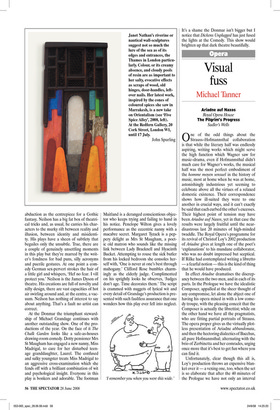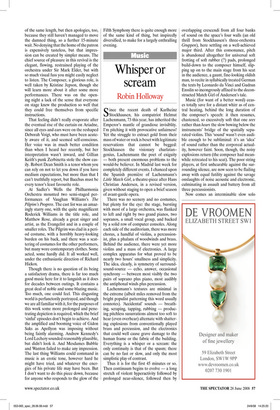Visual fuss
Michael Tanner
Ariadne auf Naxos Royal Opera House The Pilgrim’s Progress Sadler’s Wells
One of the odd things about the Strauss–Hofmannsthal collaboration is that while the literary half was endlessly aspiring, writing works which might serve the high function which Wagner saw for music–drama, even if Hofmannsthal didn’t much care for Wagner’s works, the musical half was the most perfect embodiment of the homme moyen sensuel in the history of music, most at home when he was at home, astonishingly industrious yet seeming to celebrate above all the virtues of a relaxed domestic existence. Their correspondence shows how ill-suited they were to one another in crucial ways, and it can’t exactly be said that each curbed the other’s excesses. Their highest point of tension may have been Ariadne auf Naxos, yet in that case the results were largely fruitful until the neardisastrous last 20 minutes of high-minded twaddle. The Royal Opera’s programme for its revival of Christof Loy’s 2002 production of Ariadne gives at length one of the poet’s ‘explanations’ to his mundane collaborator, who was no doubt impressed but sceptical. If Rilke had contemplated writing a libretto — a fearful notion — this is the kind of thing that he would have produced.
In effect Ariadne dramatises the discrepancy between the two men, and in each of its parts. In the Prologue we have the idealistic Composer, appalled at the sheer thought of any compromise, let alone the abject one of having his opera mixed in with a low comedy troupe, with the pleasing conceit that the Composer is actually the librettist; while on the other hand we have all the pragmatists, who are fitting partial portraits of Strauss. The opera proper gives us the virtually plotless presentation of Ariadne abbandonata, and then the hectoring dialectics of Bacchus, all pure Hofmannsthal; alternating with the brio of Zerbinetta and her comrades, urging once more that it’s best to get fun where you can find it.
Unfortunately, clear though this all is, Loy’s production throws an expensive blanket over it — a vexing one, too, when the set is so elaborate that after the 40 minutes of the Prologue we have not only an interval of the same length, but then apologies, too, because they still haven’t managed to move the damned thing, so a further 15-minute wait. No denying that the home of the patron is expensively tasteless, but that impression can be created by simpler means. The chief source of pleasure in this revival is the elegant, flowing, restrained playing of the orchestra under Sir Mark Elder, but with so much visual fuss you might easily neglect to listen. The Composer, a glorious role, is well taken by Kristine Jepson, though she will learn more about it after some more performances. There was on the opening night a lack of the sense that everyone on stage knew the production so well that they could free themselves from specific instructions.
That feeling didn’t really evaporate after the eventual rise of the curtain on Ariadne, since all eyes and ears were on the reshaped Deborah Voigt, who must have been acutely aware of it, and seemed self-conscious. Her voice was in much better condition than when I heard her recently, but her interpretation wasn’t inward, and Gillian Keith’s punk Zerbinetta stole the show easily. Robert Dean Smith is a tenor whom you can rely on not to let you down if you have medium expectations, but more than that I can’t truthfully report, but Bacchus must be every tenor’s least favourite role.
At Sadler’s Wells the Philharmonia Orchestra mounted two semi-staged performances of Vaughan Williams’s The Pilgrim’s Progress. The cast list was an amazingly starry one, with the quite magnificent Roderick Williams in the title role, and Matthew Rose, already a great singer and artist, as the Evangelist and in a couple of smaller roles. The Pilgrim was clad in a period costume, with a horribly heavy-looking burden on his back, and there was a scattering of costumes for the other performers, but many wore contemporary clothes. Some acted, some hardly did. It all worked well, under the enthusiastic direction of Richard Hickox.
Though there is no question of its being a satisfactory drama, there is far too much good music here for it to languish as it does for decades between outings. It contains a great deal of noble and some blazing music. Too much, one could feel. This disgusting world is perfunctorily portrayed, and though we are all familiar with it, for the purposes of this work some more prolonged and penetrating depiction is required, which the brief ‘sinful’ episodes don’t begin to achieve. And the amplified and booming voice of Gidon Saks as Apollyon was imposing without being faintly alarming. Andrew Kennedy’s Lord Lechery sounded reasonably plausible, but didn’t look it. And Mesdames Bubble and Wanton failed to make any impression. The last thing Williams could command in music is an erotic tone, however hard he might have tried, and whatever the energies of his private life may have been. But I don’t want to do this piece down, because for anyone who responds to the glow of the Fifth Symphony there is quite enough more of the same kind of thing, but inspiredly diversified, to make for a largely enthralling evening.



















































































 Previous page
Previous page